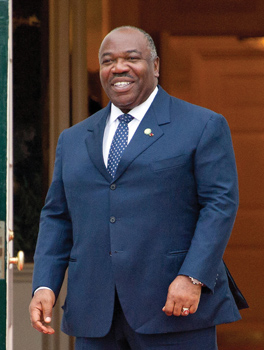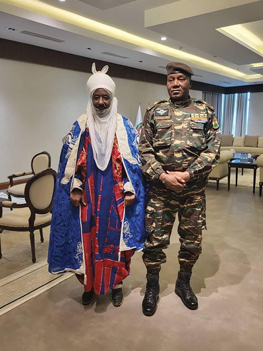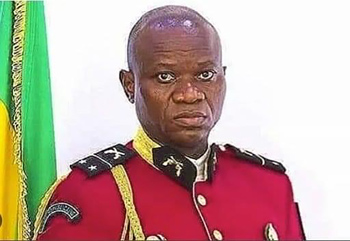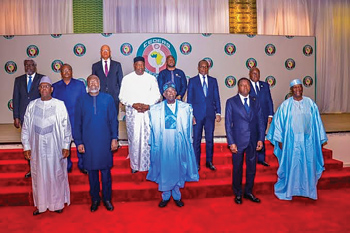RETURN OF THE JACKBOOT
09/12/23, Kayode Soyinka

Ousted Gabonese President Ali Bongo
Democracy is once again under the cosh as military men overthrow elected governments in Niger and Gabon
First, it was Niger Republic. Then, a month later, Gabon. Both were following in the footsteps of several other countries in the Francophone West Africa - Mali, Burkina Faso, Chad, Guinea - and even Sudan in East Africa. All put together, they constitute the vast expanse of land called The Sahel Region. And after a period of relative peace brought about by civil rule and democratic practice, military coups have suddenly returned on a large scale to Africa.
Until now, confidence was building that military coups in Africa, which were prevalent across the continent in the decades after most of the countries got their independence, were becoming unfashionable and something of the past. Its return in Guinea, Mali, Burkina Faso, Chad, lately Niger, and now, the latest, in Gabon, is giving the rest of Africa and the world concern that there is something fundamentally wrong with governance in Africa.
With the pattern of the coups, we have seen of late, the question observers are asking is: Why is it that all these coups are coming mostly from countries that are former colonies of France? The Niger coup follows Burkina Faso's, Guinea's, Mali's, and Chad's - all former French colonies. In fact, out of the 27 coups that have occurred in sub-Saharan Africa since 1990, about 78 percent have occurred in former French colonies, making observers wonder whether France has direct or indirect involvement in those coups, or, perhaps, the legacy of its colonial past is what is to blame for these new wave of coups.
The Niger coup has the dangerous potential of destabilising the whole of west Africa. It is the largest landlocked country in the region. A democracy, until this coup, it was run as a unitary state, bordered in the northeast by Libya, Chad in the east, Nigeria in the south, Benin, and Burkina Faso in the southwest, Mali in the west and Algeria in the northwest. Over 80 percent of its land lies in the Sahara. With a population of about 25 million, and predominantly Muslim, it is a country that is very key to western security interest because of the activities of Al Qaeda and Islamists groups who have invaded the country and made it their base since the end of the war in Libya when Muammar Qaddafi was killed. The remnants of the fighters in the Libyan war moved down south with their weapons, spread across The Sahel and settled in Mali, Burkina Faso, Guinea, and in Niger and Chad. They are so well organised, and heavily armed. They have encircled Ouagadougou; and at one stage invaded neighbouring Nigeria and partnered with Boko Haram, the local insurgency group, to destabilise Nigeria and create in the northeast of the country their own Islamic State. At one time, they managed to take over about nine local governments in north-eastern Nigeria where they succeeded in planting their flag. It took a joint task force of Nigeria, Niger (before the coup), Chad and Cameroon, to flush them out. But not completely - even up till date.
The leader of the Niger coup, General Abdourahmane Tchiani, has firmly laid the blame for staging the coup on France. He accused the ousted President Mohammed Bazoum, who was democratically elected, of being a puppet of France and its interests. He tried to use this to justify the coup and legitimise the removal of President Bazoum from power. Not only that, once he took over power, his first action was to revoke five military deals Bazoum had made with France. His action seems to have gained popular support among the Nigeriens. But what would be a more credible reason for him to stage the coup is the rumoured intention that he was about to be removed as head of the army by President Bazoum.
Niger is a member of the regional trading and political bloc ECOWAS (Economic Community of West African States). The bloc, led by Nigeria's newly elected President Bola Ahmed Tinubu, reacted promptly to stop General Tchiani and asked him to return his army to the barracks and restore the ousted president to power. This is President Tinubu's first foreign affairs challenge. ECOWAS made it clear that it would not condone military coups in its group. The block imposed sanctions on Niger and closed the country's airspace. They went further to express intention of using military force if needs be by putting ECOMOG, the region's standby military outfit, on standby to remove the junta from office. Niger has also been expelled from the African Union (AU). And the ECOWAS action has had support and backing from the European Union (EU), the United Nations (UN) and the United States of America.
The reaction of General Tchiani to ECOWAS move was nonchalant, to say the least. At first, he refused to meet with a mediating team sent to him by ECOWAS led by a prominent former Nigerian Head of State General Abdulsalam Abubakar, and the respected Sultan of Sokoto. They had to return home without seeing him. Instead, and surprisingly too, he met with the deposed Nigerian Emir of Kano, Lamido Sanusi, and, later, some Islamic Scholars.
His refusal to meet with the ECOWAS General Abubakar-led team was a PR disaster for him. It did not go down well with people across west Africa. However, the General Abubakar group refused to be frustrated, they made a second attempt to meet with him. He obliged this time, possibly because of the public opprobrium he received by shunning such eminent personalities when they first came to mediate with him.
To make the matter worse, Niger suddenly entered a military pact with neighbouring state that are also under military rule - Burkina Faso and Mali - to join force with Niger should the ECOWAS make its threat to deploy its military force, ECOMOG, to flush Tchiani and his group out of office.

Niger coup leader, General
Abdourahmane Tchiani with deposed
Emir of Kano Sanusi Lamido Sanusi.
With the situation becoming messy, ECOWAS has had no choice but to adopt a carrot and stick strategy - keeping diplomacy going and at the same time putting the ECOMOG on standby.
Putting out the coup fire in Niger was still in the works when the military in Gabon struck and staged their own coup to prevent President Ali Bongo from returning to office after being declared winner of the country's national presidential election.
However, not a few would be unbothered by President Bongo's removal from office. His family has ruled the central African state for 56 years. He himself has become an embarrassment to his country, indeed Africa, having suffered a stroke a few years ago, and unable a walk properly but still hanging on to power unhealthy as president of Gabon. The soldiers who toppled him must have seen an opportunity to remove him from office when he was declared winner again by the country's electoral commission in the 2023 elections. The commission claimed he had won "just under two-thirds" of the votes. If that controversial result had been allowed to stand, Ali Bongo would be serving a Third Term in office as president despite his bad health. The Opposition won't have that. They declared the result fraudulent. And the military struck to put an end to the 56-year Bongo dynasty! And put a stop to the international embarrassment he has been putting his country through because of his bad health. The military annulled the result of the election and dissolved "all institutions of the republic." They closed the country's borders "until further notice."
The Gabonese coup will be the eighth in former French colonies in Africa in the past three years. The remaining seven are up north in the Sahel region that has been consistently ravaged by Islamist insurgency, putting their democratically elected governments under serious pressures and leading to their civilian populations groaning and complaining that their lives are in constant danger, as their governments have been incapable of protecting them.
The soldiers who staged the coup in Gabon described themselves as "the Committee of Transition and the Restoration of Institutions." They said they represent security and defence forces in the country. "We have decided to defend peace by putting an end to the current regime." They alluded to the fact that their action was because the country had suffered from "irresponsible, unpredictable governance resulting in a continuing deterioration in social cohesion that risks leading the country into chaos."

Gabonese coup leader, Brice Clothaire
Oligui Nguema. He was Commander-in-
Chief of the Gabonese Republican
Guard.
In Niger, the ousted President Bazoum is under house arrest. In fact, the ECOWAS team that came to dialogue with the junta was allowed to see him and he took pictures with them - confirming he is alive. In the Gabon coup, the whereabout of ousted President Bongo was not immediately known (at the time of going to press). Some sources said that he is surrounded by soldiers in his house and is effectively under house arrest.
Bongo came to power in 2009 when his father Omar Bongo died. In 2018 he suffered a stroke, which incapacitated him and rendered him unable to perform his duty as president. He was urged to resign but refused. There was even an unsuccessful coup attempt in 2019 to remove him from office. The mutinous soldiers were rounded up and sent to jail.
United States-based researchers Jonathan Powell and Clayton Thyne have stated that there have been over 200 coup attempts in Africa since the 1950s. And about half of them have been successful. On the average it has been around four coups a year between 1960 and 2000. The rate of coups declined after 2000. But the return of the soldiers from the barracks started in the past couple of years with the 2020 coup in Mali. Followed by five countries, Chad, Mali, Guinea, Sudan, in 2021 and Niger in 2023. Sudan tops the list of African countries with military coups. It has had 16 coups, with six of them successful. Long-serving President Omar al-Bashir was pushed out of power after a huge public uprising. He himself had taken over power in a military coup in 1989. However, it is Burkina Faso that has the record of having the most successful coups. It has had nine military coups, only one failed. Nigeria is not left out. It has had eight military coups between January 1966 and the General Sani Abacha coup of 1993. The most populous country in Africa and its biggest economy has, however, enjoyed stable democratic rule for 24 years since 1999.

ECOWAS Heads of State at their
emergency meeting over Niger coup in
Abuja.
How would France wash its hands from these coups taking place mostly in its former colonies. When the Niger junta accused the ousted President Bazoum of being a puppet of France and revoked five military deals Bazoum had signed with France, there were jubilations on the streets among Nigeriens. They were fed up with the repressive strategies to retain control put in place by France when they granted independence to Niger which still allowed France to exploit and extract the valuable minerals and resources in Niger, like uranium. The same repressive strategy was put in place in all former French colonies after independence. France continues to interfere directly or indirectly in the affairs of its former colonies in a massive scale up till now. For instance, a legacy of France in its former colonies is the use of the currency, CFA franc, which used to be pegged on the discontinued French Franc. But since France has dropped the use of the Franc and adopted the Euro instead, France has pegged the CFA franc to the Euro, and seven out of nine Francophone countries in west Africa still use the CFA franc as their currency, guaranteed by France!
In addition, France still has defence pacts with most of its former colonies, which enables it to intervene willy-nilly either in support of a puppet leader and help to keep him in office, or to remove a leader that is considered recalcitrant. This was why leaders like former President Idris Deby of Chad and former Burkina Faso President Blaise Compaore were able to stay in power for so long. Their pro-France stance and ties with French political leaders were based on corruption, benefitting only the powerful and the elite while their poor citizens suffer and their countries lacking in basic amenities and development.
Worse of all is the defence pact between these former colonies with France to help fight the Islamist insurgencies in The Sahel region. Despite the heavy funding and troops deployed by France, the exercise has been a failure. Large sections of The Sahel region are still controlled by the insurgents and the west African governments still cannot have control of their territories. In countries like Mali and Burkina Faso, the governments are so frustrated. They see no advantage in French support. They in fact now consider it more of a liability. Mali has order French troops to leave the country, while replacing them with the Russian Wagner group.
With Niger and Gabon now joining the coup club, the consequences will be far reaching across Africa. It certainly would have a destabilising effect for West and Central Africa. And place the Africa Union (AU) between the rock and the hard place!
Comment on this story



